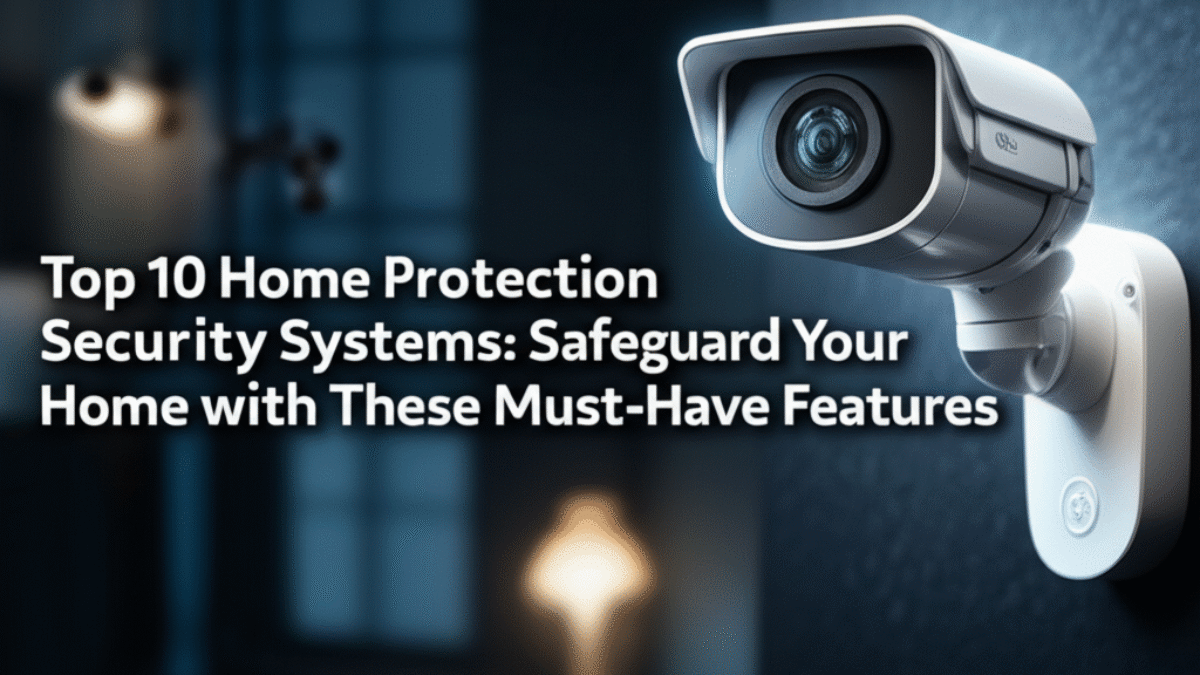When it comes to safeguarding your home, the right security system can make a world of difference. In an age where crime rates fluctuate and technology evolves, homeowners need reliable protection that meets their unique needs. Whether you’re looking to deter potential burglars, monitor your property remotely, or simply feel more secure in your own space, there are numerous options available to choose from. But how do you know which system is right for you?
In this article, we’ll delve into the top 10 home protection security systems that you should consider, highlighting their must-have features to help you make an informed decision. From traditional alarm systems to advanced smart home technologies, we’ll explore the options that can enhance your home’s security. If securing your home is a priority for you, stick around as we uncover insights that not only educate but empower your decision-making process.
We’ll start by providing an overview of what home protection systems are and the essential components you should look for. Next, we’ll dive into each of the top ten systems, breaking down their features, benefits, and practical applications. Lastly, we’ll address some frequently asked questions to clear up any uncertainties you might have. By the end of this article, you’ll be equipped with the knowledge to choose the best security system for your home.
Understanding Home Protection Security Systems
At its core, a home protection security system is designed to detect unauthorized entry into your home and alert you or the authorities. These systems can vary widely in terms of technology, complexity, and price. The rise of smart home technology has transformed traditional security systems, integrating them with other home devices for enhanced functionality.
Typically, a home security system includes components such as:
- Security Cameras: Monitor the exterior and interior of your home.
- Motion Detectors: Detect movement and trigger alarms.
- Door and Window Sensors: Alert you when doors or windows are opened unexpectedly.
- Control Panels: The central hub to manage your security system.
- Mobile Apps: Allow remote monitoring and control of your system.
Key Components of Home Protection Systems
Before diving into specific systems, it’s crucial to understand the key components that can enhance your home security experience. Here are some must-have features to consider:
1. Remote Access
With the rise of smartphones, having the ability to monitor your home remotely is a game changer. Many modern systems come with mobile apps that allow you to check camera feeds, receive alerts, and even control your system from anywhere in the world.
2. Smart Home Integration
Integrating your security system with other smart devices, such as smart lights, locks, and thermostats, can enhance your home’s safety and convenience. For example, you can program your lights to turn on when a motion detector is triggered, simulating occupancy when you’re away.
3. 24/7 Monitoring
Many security systems offer professional monitoring services that keep an eye on your property around the clock. This means that if an alarm is triggered, a professional team can respond immediately, contacting the authorities if necessary.
4. Video Surveillance
Having security cameras installed can provide both deterrence and evidence in the event of a crime. Look for systems that offer high-definition video, night vision capabilities, and cloud storage options for recorded footage.
5. User-Friendly Interface
The best security systems are easy to use. A complicated system can lead to frustration and may not be used effectively. Look for systems with intuitive interfaces and straightforward setup processes.
Top 10 Home Protection Security Systems
Now that we’ve covered the essential features of home protection systems, let’s explore the top ten systems that stand out in the market today.
1. ADT Security
Overview: ADT is one of the oldest names in home security, offering comprehensive monitoring solutions.
Key Features:
- 24/7 professional monitoring
- Smart home compatibility
- Customizable security packages
- Mobile app for remote management
Why Choose ADT: ADT’s experienced professionals provide peace of mind with their reliable monitoring services. Their systems are highly customizable to fit your specific needs.
2. Vivint
Overview: Vivint is known for its advanced smart home technology integration.
Key Features:
- Smart home automation features
- High-quality security cameras
- 24/7 monitoring with quick response times
- Mobile app for complete control
Why Choose Vivint: If you’re looking to integrate your security with other smart devices, Vivint provides seamless connectivity and user-friendly controls.
3. Ring Alarm
Overview: Ring is well-known for its video doorbells and has expanded into comprehensive home security systems.
Key Features:
- DIY installation
- Affordable pricing
- Mobile alerts and monitoring
- Integration with Ring cameras
Why Choose Ring: Ring is a fantastic option for those who want a cost-effective solution without sacrificing quality. Its DIY approach makes it accessible for many homeowners.
4. SimpliSafe
Overview: SimpliSafe offers flexible wireless options and straightforward setup.
Key Features:
- Customizable equipment packages
- No contracts required
- 24/7 monitoring options
- Easy mobile app control
Why Choose SimpliSafe: If you want an affordable system that you can tailor to fit your needs without long-term commitments, SimpliSafe is an excellent choice.
5. Frontpoint
Overview: Frontpoint is recognized for its exceptional customer service and user-friendly systems.
Key Features:
- DIY installation
- Mobile app for real-time alerts
- Flexible equipment choices
- 24/7 monitoring with rapid response
Why Choose Frontpoint: If customer service is important to you, Frontpoint’s reputation for support and satisfaction should be a key factor in your decision.
6. Arlo
Overview: Arlo specializes in high-definition security cameras and outdoor monitoring.
Key Features:
- Wireless, weather-resistant cameras
- Night vision capabilities
- Smart home compatibility
- Cloud storage options
Why Choose Arlo: For those primarily focused on video surveillance, Arlo’s cameras offer exceptional quality and a wide range of features tailored for outdoor use.
7. Nest Secure
Overview: Nest Secure offers an integrated smart home security system with Google Home compatibility.
Key Features:
- Smart home integration
- Easy-to-use mobile app
- Custom alerts and notifications
- Home automation features
Why Choose Nest: If you’re already invested in the Google ecosystem, Nest Secure provides seamless integration with other Google devices.
8. Wyze Home Security
Overview: Wyze is known for its budget-friendly products that don’t skimp on quality.
Key Features:
- Affordable pricing
- Wide range of smart devices
- Cloud storage options for video recordings
- Mobile app with easy setup
Why Choose Wyze: If you’re looking for a cost-effective solution without sacrificing quality, Wyze offers impressive features at a fraction of the price.
9. Blue by ADT
Overview: A more affordable and flexible option from ADT, Blue offers DIY home security solutions.
Key Features:
- DIY installation
- Mobile app with real-time alerts
- 24/7 professional monitoring available
- Smart home integrations
Why Choose Blue by ADT: For those who appreciate ADT’s reputation but prefer a more flexible, budget-friendly option, Blue provides a great compromise.
10. Cove Security
Overview: Cove is known for its user-friendly systems and transparent pricing.
Key Features:
- DIY installation
- No contracts required
- Mobile app for easy control
- 24/7 professional monitoring
Why Choose Cove: If you’re looking for transparency and simplicity, Cove’s straightforward pricing and systems make it an attractive option.
Benefits and Importance
Investing in a home protection security system is not just about preventing theft; it’s about creating a safe environment for you and your loved ones. Here are some key benefits:
- Peace of Mind: Knowing you have a security system in place allows you to relax, whether at home or away.
- Deterrence: A visible security system can deter potential burglars and intruders.
- Emergency Response: In case of an emergency, having a system that connects you to first responders can save crucial time.
- Insurance Discounts: Many insurance companies offer discounts for homes with security systems, potentially saving you money in the long run.
Practical Applications
To illustrate how effective these systems can be, let me share a few practical examples.
Case Study 1: The Smith Family
The Smiths installed a security system after experiencing a series of neighborhood break-ins. With cameras positioned around their home and door sensors, they felt a noticeable difference in their peace of mind. The system alerted them to any unusual activity, allowing them to reach out to local authorities quickly when they spotted a suspicious figure outside their home.
Case Study 2: The Rodriguez Business
After a break-in at their small business, the Rodriguez family opted for a comprehensive security system that included video surveillance and 24/7 monitoring. The cameras not only helped deter further criminal activity but also provided invaluable evidence that assisted the police in recovering stolen property.
In both cases, investing in a home security system transformed their approach to safety, illustrating the importance of proactive measures in protecting what matters most.
Frequently Asked Questions
What is a home protection security system?
A home protection security system is a combination of hardware and software designed to protect your home from unauthorized entry and other emergencies. It typically includes components such as alarms, sensors, cameras, and monitoring services.
How do I choose the right security system for my home?
When selecting a security system, consider factors like your budget, the size of your home, the type of monitoring you prefer (DIY vs. professional), and whether you want smart home integration. Researching different brands and reading reviews can also help you make an informed decision.
Are DIY systems effective?
Yes, many DIY systems can be highly effective. They offer flexibility and cost savings. However, the effectiveness can depend on the quality of the equipment and your ability to set it up correctly. Ensure you choose a reputable brand and follow installation guidelines closely.
What are the costs associated with home security systems?
Costs can vary widely depending on the system and services you choose. Basic systems may start at a few hundred dollars, while comprehensive setups with professional monitoring can range from $30 to $100 per month. It’s essential to consider both upfront and ongoing costs when budgeting for a security system.
Can I integrate my security system with other smart home devices?
Many modern security systems offer compatibility with smart home devices such as lights, locks, and thermostats. This integration can enhance your home’s safety and provide additional convenience, allowing you to control everything from one central app.
What should I do if my security system alerts me?
If your security system alerts you to a potential breach, it’s essential to remain calm. Check your mobile app for camera feeds if available, and consider contacting local authorities


